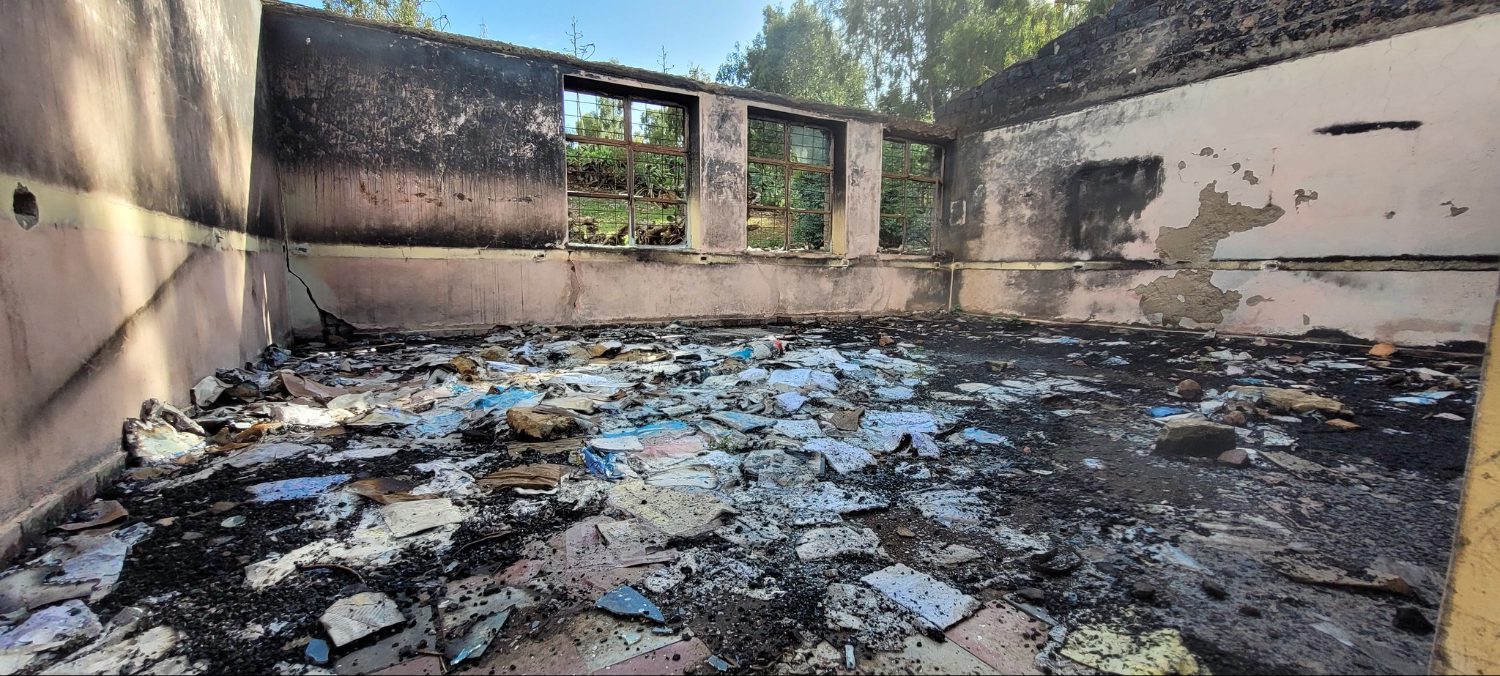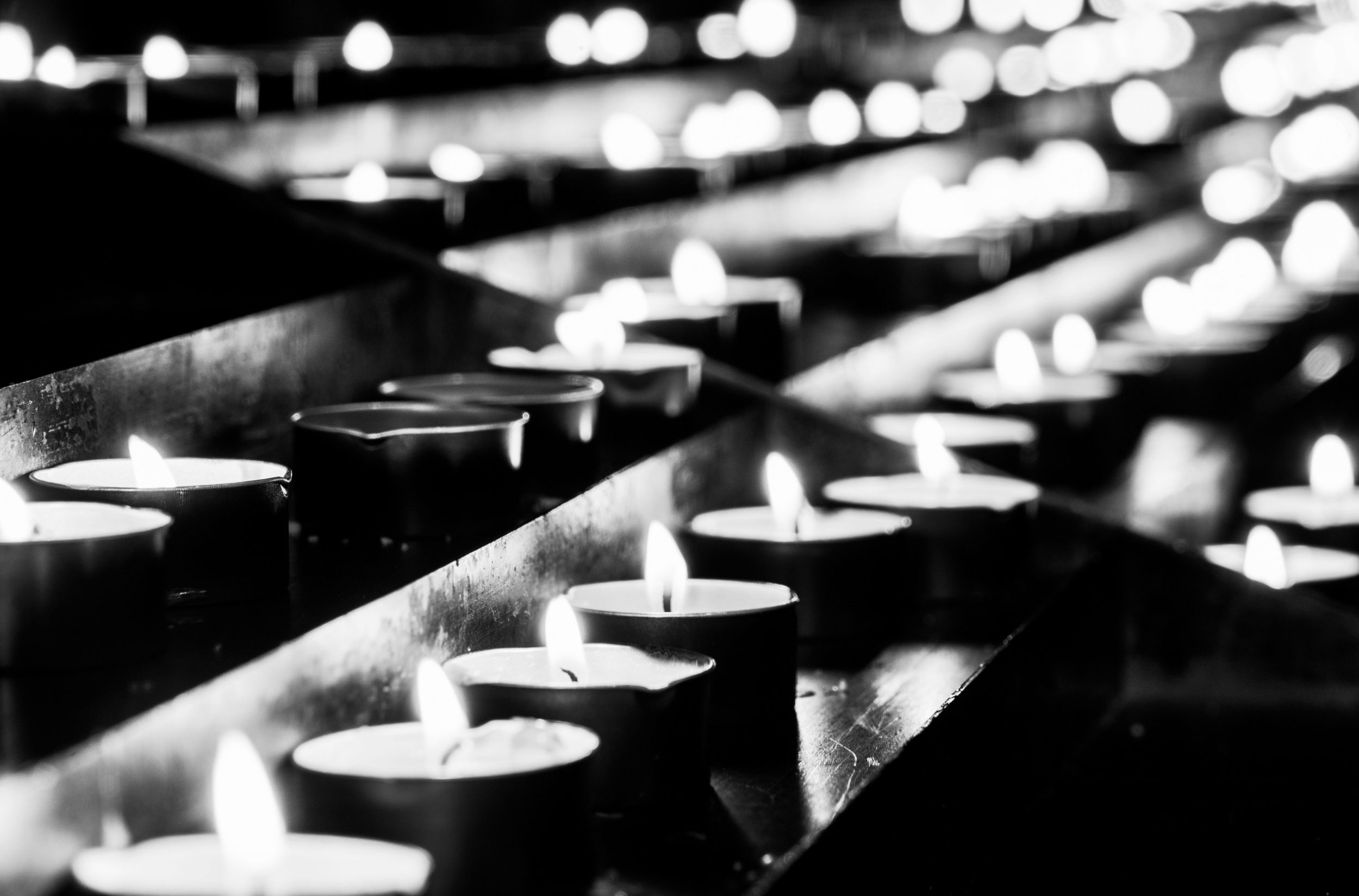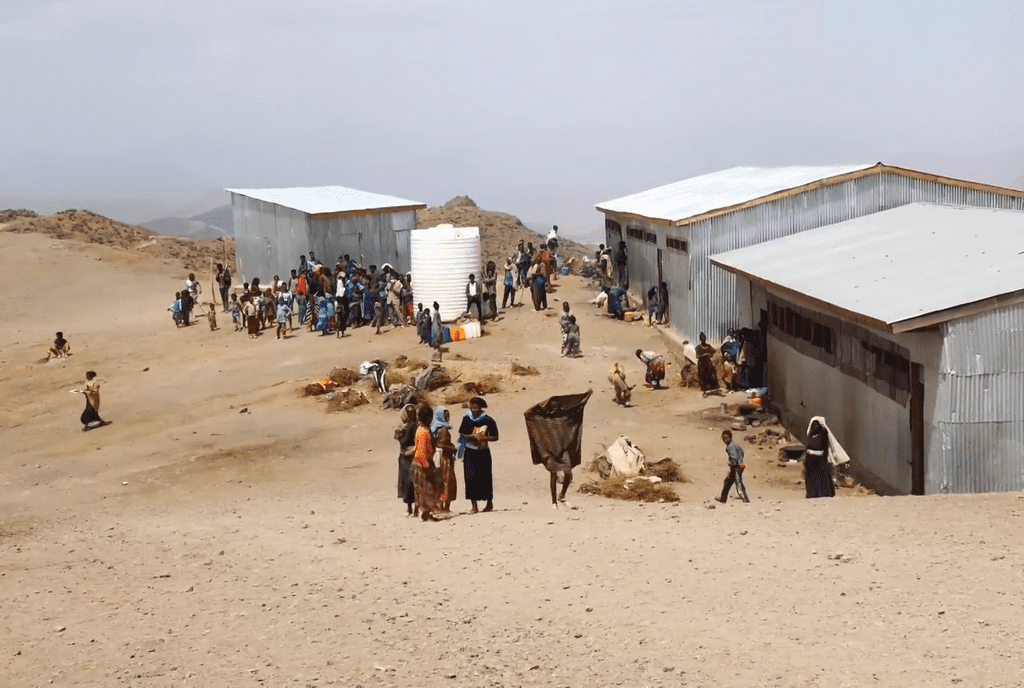This is the first of a three part essay by Mulugeta Gebrehiwot Berhe, describing how the war that began in 2020 has fundamentally altered life in Tigrayan capital city, Mekelle.
Beautiful Mekelle is limping under siege. It is already more than six months since it fell under a complete siege. No telecommunication and internet services, no banking and related services and businesses, no electricity, no commercial flights in and out, no land communication outside Tigrai as it is 360 degrees encircled by hostile forces. In July, Abiy Ahmed, in his publicly televised speech to his parliament said that he ‘has reduced Mekelle’ — the once vibrant city with a pre-war estimated population of 700,000 that was one of the economic and political centers of Ethiopia — ‘to Beshasha,’ a small district town where he grew up in Jima, Agaro.
His statement was followed by an interview with General Abebaw Tadesse, a retired but reinstated Lieutenant General, who was asked why the ENDF evacuated Mekelle and most of Tigrai. He said the following: We have destroyed all the institutions of the government, we have destroyed all the social and economic infrastructure, and through these actions we have fulfilled our objectives. He was publicly admitting that his army and its allies have downgraded Tigrai to what it is today. General Abebaw tacitly expressed the objectives of the military campaign: destruction, pure and simple. As a recognition of what he and his army did, this retired Lt. Gen. is now promoted into a four star general.
We invite you to Mekelle. You are free to come if you can pass through the blockade. You are free to travel navigate the city and witness yourself that Abiy Ahmed has succeeded in reducing Mekelle not to a village like Beshasha, but something worse than that.
When you arrive, this is what you will see.
First of all, you will see a hungry city.
Data from the bureau of health of the regional administration indicate that the nutrition situation across Tigrai has also been steadily getting worse. Currently over 1.6 million children under five and lactating and pregnant women need nutrition intervention as the rate of malnutrition rate among this group has gone up to 60 percent. Across Tigrai, 54 percent of water points are not functional, affecting water access to 3.5 million people. As a result of this humanitarian catastrophe, the famine classification is expected to reach the highest level, IPC 5, in the coming few months.
This what you see when you move into Mekelle. Hundreds of thousands of displaced people live in shelters. They live in school compounds and Kebelle meeting halls turned into makeshift camps. Most depend on the support of the city dwellers, as they receive little support from the provisional administration in place from December until June. Since July, the priority of the city dwellers shifted towards supporting the TDF which left the IDPs without food support. Men and women with families employ themselves as cleaners, daily laborers, and any other job they may find. Most live on just one meal per-day by selling whatever valuables they had. Fig fruit massively supplied from the surrounding villages served as the main source of food for the months of July and August. The fig season was then replaced by guava fruits as of the end of August. A single fruit of fig and guava were being sold for 3 Birr and 5 Birr respectively against its usual price of 1-2 Birr per piece. The stores of all humanitarian organizations have run empty as a result of the complete siege of Mekelle from any outside assistance. For this reason, the city is full of hungry people which you can visibly see while walking on the streets.
The overall condition of children in the region is critical. Data from the regional health bureau indicates that acute malnutrition in children under five has hit 29.1 percent, of which 7.1 percent have been diagnosed with severe acute malnutrition (SAM). Let me take you to Ayder, the referral hospital in the city, and give you a short tour of the Pediatrics and Child Health Department of the hospital which is treating children affected by hunger among other things. Here are some of the figures you hear from the head of the department as related to children under treatment for malnutrition.
The department along the Pediatrics and Child Health department of Mekelle hospital regularly screens children under 5 years old from the IDP centers in Mekelle for mid-upper arm circumference (MUAC), a measure of malnutrition. They screened 879 children in January 2021, 2749 in May, and 1481 in August. The rate of children diagnosed for malnutrition was 8.9% for January; 11.4% for May; and, 20.26% for the month of August. Out of the 300 children diagnosed for malnutrition and undertreatment at the two hospitals, 260 of them were suffering from Medium Acute Malnutrition (MAM) and the remaining were diagnosed as reaching the stage of Severe Acute Malnutrition (SAM). By January this year, the level of SAM was 7% and MAM was 22%.
The number of SAM cases of children treated in the referral hospital has tripled as of September 2021. Unless the current problem of supplies to the hospital (both medical and non-medical inputs), Dr. Mohamed Mustafa, head of the Pediatrics and Child Health Department indicates that the 260 children with MAM may soon join those children suffering SAM. Sixteen children died in the two hospitals in the months of July – October 2020. The hospital used to administer 10 different vaccines for children and none of them are being delivered now so that we might see diseases like polio re-emerging in the coming months. After a continuous blockage of any medical supplies the ICRC has now began airlifting some medical supplies, a small move enough to capture headlines in major new outlets. Whether this supply will be enough to re-instate children’s vaccination is yet to be seen.
The referral system in Tigrai is broken as most of the rural clinics and hospitals are ransacked and non-operational. For this reason, children and mothers who arrive at the referral hospital arrive in critical condition. Dr. Mohammed remembers a woman who carried her child to the hospital and who immediately collapsed of hunger at her arrival to the front-line desk of the hospital. Both mother and child were treated for malnutrition and related health problems. It is very common to find the parents of affected children to be themselves afflicted by hunger.
Dr. Mohamed indicates that a number of the children under treatment for MAM and SAM also come from families who normally had a good income who can’t access their deposits and assets elsewhere due to the complete siege of the city. He cited the example of the son of a physician he treated for MAM as an indication to how much the famine has affected society including the middle class in Mekelle. Underweight delivery of children (less than 2.5 kgs at birth) is increasing observed by physicians, a problem with multiple, often life-long, health effects on a child.
You will see a dark city
The federal government made sure that the electric line connecting Tigrai to the national grid was cut and there was no electricity in the city for the first six weeks after the TDF took over. The engineers of Tigrai then diverted the power generated from the Tekeze dam to Tigrai and Mekelle started getting light as of the third week of July, but that was again interrupted for four more weeks as the dam was overflowing due to heavy rains and stopped generating until the water could get lower. During those days even those people with generators were hardly using them as the cost of benzine (when available) exceeded 600 Birr per liter as opposed to its official price of 25 Birr per liter while diesel is now fetching 350 Birr per liter when available. The prince of a single candle rose from 3 Birr per piece to 30 Birr per piece.
The city during those days was dark in the evenings and Mekelle had no night life. For that matter, you no longer hear loud music coming out of bars and pubs. Most of them are closed and those opened serve locally brewed beverages like sewa and tselim sewa (locally brewed beer), or meis (honey wine or mead). These are the common notices posted you see at the entrance of those opened bars and pubs: ‘Sewa Alena’ ‘Filter Alena’ ‘Mies Alena-Mies Hagereselam’. Whenever bars have something to sell, their transaction cost and therefore their selling cost is high and not affordable for the customers that are caught by cash shortage as they can’t withdraw any money from their bank accounts.
There are hardly any cars in the streets of Mekelle due to the unavailability of fuel in gas stations. What can be bought in the streets is smuggled and costs beyond what most people can afford. The little fuel left in the city is rationed to the few taxis that operate. This has made the waiting time for a taxi long and expensive when found. As a result, most people in Mekelle walk.
You will see hospitals with no medicine and functioning diagnosis equipment
Some pharmacies and drug stores are closed as their shelves emptied. Many of them open their doors for few hours, but do not offer much. There are too many stories of the untimely death of patients who were surviving under drug regimens for chronic health issues. Replenishment of drugs for patients of diabetics, hypertension, and HIV patients are not available. The only kidney dialysis center in Ayder referral hospital has stopped providing service for patients over the last three months and several of its patients have already died as a result of the discontinued services.
Here are some more facts you will find at the referral hospital. Drug availability in the hospital before the eruption of the conflict averaged 70 – 80% of its requirements. As the war began, the availability of medicines continually decreased month-by-month to reach 20 – 30% after the city fell under a complete siege. Hospital data indicates that the total stock of antibiotics and anti-pain medication will last only for two weeks. It has already run out of chemotherapy, and several lab and kidney dialysis agents. The whole city, for that matter the whole region, currently doesn’t have a single functioning advanced imaging equipment like CT-Scan and MIR due to lack of parts. The ICRC has begun airlifting some medical supplies as of last week each day dropping three to four quintals of medical supplies, a news that have already captured the headlines of major media outlets. Whether this supply will continue and make significant difference in the service is yet to be seen.
The overall condition of the health services in Tigrai is one of the most heart-breaking moments for Tigraian physicians. Dr. Mohammed Mustafa says in frustration: ‘You know how to diagnose a disease. You have the equipment and the expertise to do the diagnosis. But you can’t diagnose either a reagent is not available or the machine needs a replacement for a fast-moving item. You diagnose a patient for a disease and you prescribe the medicine; but you don’t have that medicine whose cost at times is token when available. Yet, you see that patient dying because there is nothing you could do to save her/his life. What else could be heart breaking for a physician who availed him/her self for a service?’
You will hear horrendous stories of sexual violence in its hospitals and safe houses
Women and girls in Mekelle, like the rest of the Tigraian women and girls, have suffered a lot as the ENDF, EDF, Amhara militia, and assortment of forces on a genocide mission used sexual violence as an instrument of their war. There are several safe houses that accommodate victims of sexual violence for medical treatment along psychological and physical rehabilitation. Let me take you to the one-stop service center at Ayder Referral hospital to just give you a glimpse of what happened in Tigrai in the last twelve months.
At the center you will find Mihira Redae, a social worker responsible for coordinating the center who will give you a briefing on the services of the service center once you got the clearance from the hospital authority to do so. Victims of sexual violence face multiple problems: medical, psychological, and social problems. As of October 2020, the center has facilitated the hospitalized treatment of 470 women and girl victims of sexual violence for multiple medical, psychological, and social problems. The center has also facilitated the interruption of rape-induced pregnancy for over 238 women and girls as out-patients.
Mihira narrates the stories she heard from victims: that most rapes were perpetrated against married women and usually in front of their children and family members and at times in front of their husbands. The crimes were committed along with dehumanizing insults on the victims. The pervasiveness of crime was so much that soldiers of the ENDF even raped a medical school student within the compound of the referral hospital.
Helen Girmay, a mother of two, was one of the victims of sexual violence from Eedaga Hamus. The soldiers of the EDF and ENDF killed her 12-year-old son. She was then gang-raped while seeing her slain son in front of her. She came to Ayder hospital with multiple medical problems and traumatized by the brutality she faced. Helen had exposed the atrocities to the public several times and the center felt she was fully rehabilitated. However, Mihira, with tears in her eyes, told me that she just heard of Helen’s death.
Nigisti (her name changed) is a sixteen-year-old from the rural areas of central Tigrai. She was raped by EDF soldiers at the age of fifteen. She didn’t realize that she was pregnant from the rape until it was too late to interrupt the pregnancy, as it would have been medically dangerous to her health. Her parents were then outraged by her pregnancy and kicked her out of the house, advising her that if and when she wishes to return and be readmitted to the family, should come back without the child. She has now given birth to a healthy child and is nursing him in a safe house.
There are a number of rape victims who have now given birth to children conceived as a result of rape. Some of them do not have any psychological attachment with the new-born ones and others are trying to cope. Hadash Aschenaki, the legal counselor of the center, says that the many new mothers are considering giving the children up for adoption and the center is considering whether this could be in the best interest of the kids and their mothers.
After hearing to the horrendous stories of sexual violence you become puzzled by how a perverted political motive could turn human beings into beasts, capable of committing crimes in this manner.
This essay continues in two more parts.


